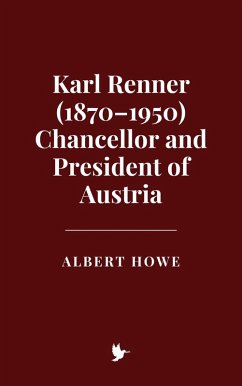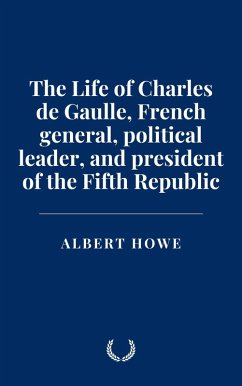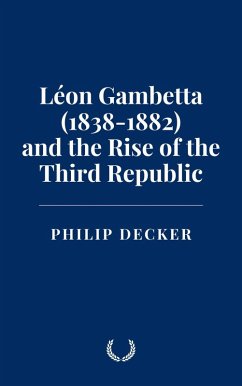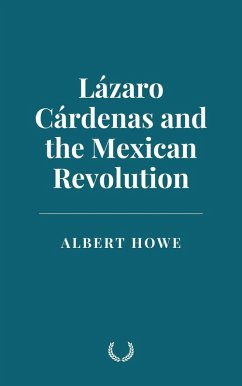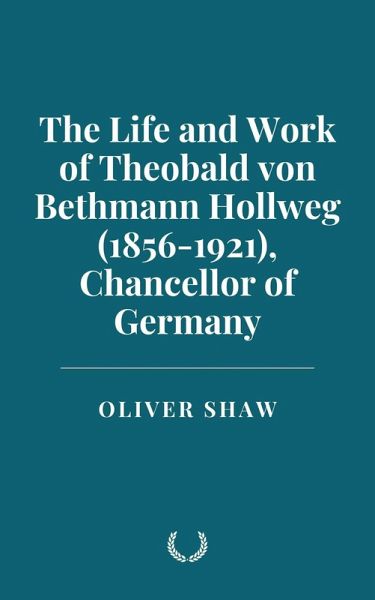
The Life and Work of Theobald von Bethmann Hollweg (1856-1921), Chancellor of Germany (eBook, ePUB)

PAYBACK Punkte
0 °P sammeln!
Theobald von Bethmann Hollweg, Chancellor of the German Empire from 1909 to 1917, is a complex figure whose legacy is shaped by both his intellectual commitment to a morally responsible state and his inability to navigate the forces of militarism and total war that defined World War I. His political philosophy, rooted in German idealism, emphasized the ethical responsibility of the state to guide its citizens toward moral good, while also balancing the demands of social reform and national stability. As Chancellor, Bethmann Hollweg attempted to modernize Germany through gradual reform, focusin...
Theobald von Bethmann Hollweg, Chancellor of the German Empire from 1909 to 1917, is a complex figure whose legacy is shaped by both his intellectual commitment to a morally responsible state and his inability to navigate the forces of militarism and total war that defined World War I. His political philosophy, rooted in German idealism, emphasized the ethical responsibility of the state to guide its citizens toward moral good, while also balancing the demands of social reform and national stability. As Chancellor, Bethmann Hollweg attempted to modernize Germany through gradual reform, focusing on social welfare, labor rights, and diplomacy, but was repeatedly thwarted by the military's growing influence and the Kaiser's authoritarianism.
Bethmann Hollweg's most significant and controversial decision, the "blank check" given to Austria-Hungary in 1914, led to the escalation of World War I. His initial hope for a short, decisive conflict was shattered as the war dragged on, and his repeated attempts to negotiate peace were rejected by both the military and the Kaiser. His resignation in 1917 marked the collapse of civilian control over the war effort and highlighted the dominance of the military in German politics.
The end of the war and the collapse of the German Empire in 1918 left Bethmann Hollweg's ideals in tatters. Though he remained critical of the Treaty of Versailles and the Weimar Republic, his vision of a strong, ethical state was ultimately displaced by the political and social upheavals of post-war Germany. Bethmann Hollweg's legacy, marked by his attempts to reconcile idealism with the brutal realities of war, remains contested. His life offers valuable lessons in the tensions between ethical governance and the demands of military necessity, illustrating the complex relationship between statecraft, national survival, and the moral responsibilities of leaders during times of crisis.
Bethmann Hollweg's most significant and controversial decision, the "blank check" given to Austria-Hungary in 1914, led to the escalation of World War I. His initial hope for a short, decisive conflict was shattered as the war dragged on, and his repeated attempts to negotiate peace were rejected by both the military and the Kaiser. His resignation in 1917 marked the collapse of civilian control over the war effort and highlighted the dominance of the military in German politics.
The end of the war and the collapse of the German Empire in 1918 left Bethmann Hollweg's ideals in tatters. Though he remained critical of the Treaty of Versailles and the Weimar Republic, his vision of a strong, ethical state was ultimately displaced by the political and social upheavals of post-war Germany. Bethmann Hollweg's legacy, marked by his attempts to reconcile idealism with the brutal realities of war, remains contested. His life offers valuable lessons in the tensions between ethical governance and the demands of military necessity, illustrating the complex relationship between statecraft, national survival, and the moral responsibilities of leaders during times of crisis.
Dieser Download kann aus rechtlichen Gründen nur mit Rechnungsadresse in A, B, CY, CZ, D, DK, EW, E, FIN, F, GR, H, IRL, I, LT, L, LR, M, NL, PL, P, R, S, SLO, SK ausgeliefert werden.




